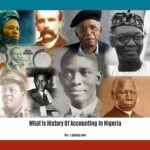Embark on [- A Journey Through Time: The History of Accounting and Its Profound Impact on Financial Practices]. Discover how accounting has evolved from ancient civilizations to its current sophisticated form, shaping the way businesses and economies operate. Explore key events, influential figures, and innovations that have defined the history of accounting, understanding how this field has played a pivotal role in the development of modern financial practices.
Key Takeaways:
Accounting’s roots date back to ancient civilizations, with evidence from Mesopotamia, Egypt, and Babylon.
Luca Pacioli’s 1494 book on double-entry accounting revolutionized the field.
Accounting’s history can be divided into four distinct periods:
- Ancient Civilizations to Middle Ages
- Italian Renaissance
- Industrial Revolutions
Modern Accounting
The 1929 Wall Street Crash led to accounting reforms and standards to protect investors and markets.
Modern accounting employs technology for automated data analysis and reporting of financial trends.
Accounting is crucial for business, finance, and society, with versatile and dynamic applications.
History of Accounting
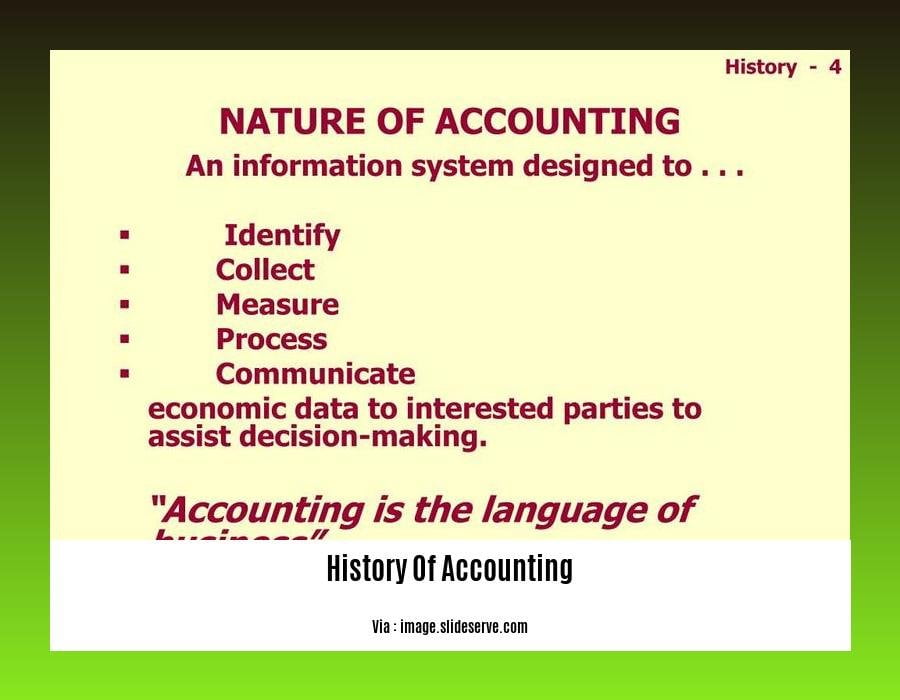
Accounting, the language of business, has a rich and fascinating history that dates back to ancient civilizations. It’s a journey through time, revealing how we’ve measured, recorded, and analyzed financial transactions over centuries.
Ancient Roots of Accounting
In ancient Mesopotamia, Egypt, and Babylon, merchants and government officials kept meticulous records of crops, herds, and transactions using clay tablets and papyrus scrolls. These early accounting practices laid the foundation for the development of more sophisticated systems in the centuries that followed.
The Renaissance and the Birth of Modern Accounting
The Italian Renaissance witnessed a surge in trade and commerce, leading to the emergence of modern accounting as a profession. In 1494, Luca Pacioli, a Franciscan friar and mathematician, published “Summa de Arithmetica, Geometria, Proportioni et Proportionalita,” which included a treatise on double-entry bookkeeping. This revolutionary method of recording transactions revolutionized accounting and laid the groundwork for the accounting systems we use today.
The Industrial Revolution and the Rise of Corporate Accounting
The Industrial Revolution brought about a surge in business activity, leading to the rise of large corporations and the need for more complex accounting systems. Companies needed to track not only their financial transactions but also their assets, liabilities, and equity. As a result, accounting evolved to meet these demands, becoming an essential tool for managing and reporting on corporate performance.
The 20th Century and the Evolution of Accounting Standards
The 20th century witnessed significant developments in accounting. The Wall Street Crash of 1929 highlighted the need for greater transparency and accountability in corporate financial reporting. In response, governments and professional accounting bodies around the world implemented accounting standards and regulations to ensure the accuracy and reliability of financial statements.
The Digital Age and the Transformation of Accounting
The advent of computers and the internet has dramatically transformed accounting practices. Today, accounting software automates many of the tasks that were once done manually, freeing up accountants to focus on more strategic and analytical roles. Cloud-based accounting systems have also made it easier for businesses to access their financial data anytime, anywhere.
The Future of Accounting
The future of accounting is bright. As technology continues to evolve, accountants will increasingly use data analytics and artificial intelligence to gain deeper insights into financial data and make more informed decisions. Accounting will continue to play a vital role in ensuring the financial health and sustainability of businesses and organizations.
Accounting has come a long way since its humble beginnings in ancient civilizations. It has evolved to meet the changing needs of businesses and societies, becoming an indispensable tool for managing financial resources and making informed decisions. As we move forward, we can expect accounting to continue to adapt and innovate, playing an increasingly crucial role in shaping the financial landscape of the 21st century.
Learn more about the history of accounting, tracing its evolution from ancient civilizations to modern practices and the pivotal role it has played in shaping financial systems.
Uncover the rich narrative of the history of accounting in Nigeria, delving into its unique origins, the challenges it faced, and its contributions to the country’s economic growth and development.
History Of Accounting Pdf
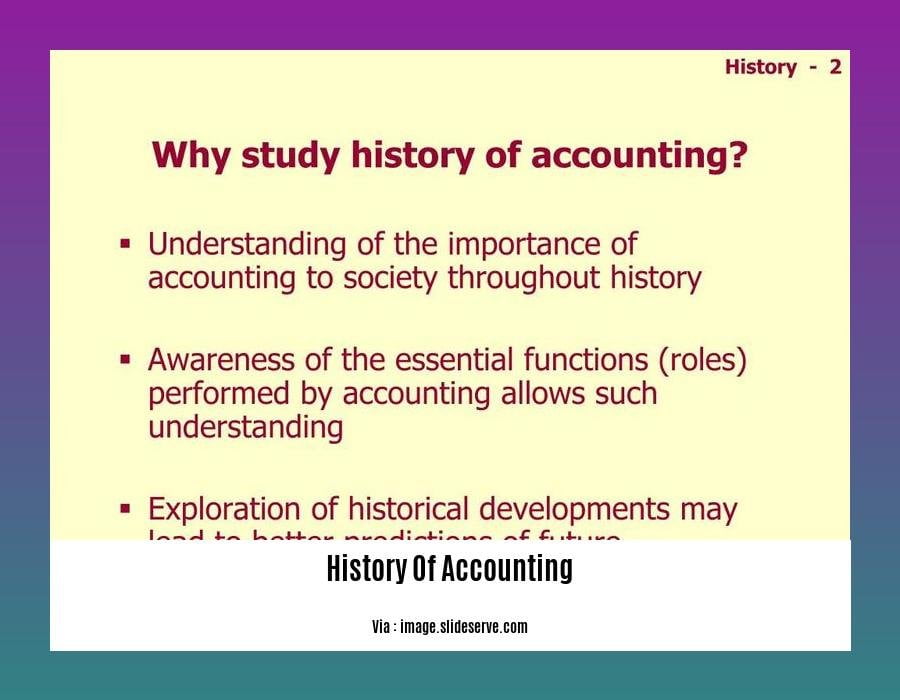
In the realm of finance, a comprehensive understanding of the history of accounting is akin to unearthing the roots of a towering oak tree. From its ancient origins to its profound impact on modern financial practices, the journey of accounting is a captivating tale of human ingenuity, evolving societal needs, and the relentless pursuit of accuracy and transparency.
Key Takeaways:
Ancient civilizations laid the foundation for accounting practices, tracking crops, herds, and transactions.
The Italian Renaissance witnessed the emergence of double-entry accounting, revolutionizing financial record-keeping.
The Industrial Revolution propelled accounting into a profession, catering to the complexities of mechanized economies.
The 20th century brought forth standardized accounting principles, regulations, and technological advancements.
Today, accounting plays a pivotal role in ensuring the integrity and reliability of financial information.
From Humble Origins to Global Significance
In ancient Mesopotamia, Egypt, and Babylon, the seeds of accounting were sown. The tracking of crops, herds, and transactions marked the nascent stages of financial record-keeping. As societies grew more intricate and trade expanded, the need for systematic accounting practices intensified.
The Renaissance Revolution: Double-Entry Accounting Takes Center Stage
The 14th century marked a pivotal moment in accounting history. Luca Pacioli, an Italian mathematician and Franciscan friar, published a treatise titled “Summa de Arithmetica, Geometria, Proportioni et Proportionalità” in 1494. This groundbreaking work introduced Europe to the concept of double-entry accounting, a system that revolutionized financial record-keeping.
Double-entry accounting fundamentally changed the way businesses recorded transactions, introducing the concept of debits and credits and ensuring that every transaction had two entries, one on the debit side and one on the credit side. This rigorous approach to accounting brought a new level of accuracy and transparency to financial records, laying the groundwork for modern accounting practices.
The Industrial Age: Accounting Steps into the Spotlight
The Industrial Revolution, with its mechanized economies and complex business structures, propelled accounting into a profession of its own. As businesses grew in size and complexity, the need for accurate and reliable financial information became paramount. Accountants emerged as the guardians of financial integrity, ensuring that companies’ financial statements accurately reflected their economic realities.
The 20th Century: Standardization, Regulation, and Technological Advancements
The 20th century witnessed a surge of developments that indelibly transformed the accounting landscape. Standardization of accounting principles, the emergence of regulatory bodies, and the advent of technology revolutionized the way accounting was practiced.
Standardization efforts, such as the Generally Accepted Accounting Principles (GAAP), brought uniformity to financial reporting, enabling investors, creditors, and other stakeholders to compare companies’ financial statements on a level playing field. Regulatory bodies, such as the Securities and Exchange Commission (SEC) in the United States, were established to oversee financial reporting and ensure compliance with accounting standards.
Technological advancements, from the introduction of electronic calculators to the rise of computerized accounting software, further streamlined accounting processes and enhanced the accuracy and efficiency of financial record-keeping.
Conclusion: A Journey of Adaptation and Innovation
The history of accounting is a testament to humanity’s unwavering pursuit of understanding financial transactions and presenting them in a meaningful and reliable manner. From its humble origins in ancient civilizations to its profound impact on modern financial practices, accounting has undergone a remarkable journey of adaptation and innovation, shaping the way businesses operate and financial decisions are made.
Sources:
- A Brief Accounting History To Date
- HISTORY OF ACCOUNTING FROM THE ANCIENT TIMES UNTIL TODAY
FAQ
Q1: What were the significant developments in accounting during ancient civilizations?
A1: In ancient civilizations, accounting involved tracking crops, herds, and transactions using clay tablets and papyrus scrolls. The use of double-entry bookkeeping during this period laid the foundation for modern accounting practices.
Q2: How did the Italian Renaissance influence the evolution of accounting?
A2: During the Italian Renaissance, accounting practices were refined to serve the needs of merchants and traders. Luca Pacioli’s book on double-entry accounting in 1494 revolutionized the field, providing a structured approach to recording financial transactions.
Q3: What impact did the Industrial Revolution have on accounting practices?
A3: The Industrial Revolution brought about increased business complexity and the need for more sophisticated accounting methods. This period witnessed the development of cost accounting, depreciation, and other techniques to measure corporate performance and ensure compliance.
Q4: What were the major accounting reforms implemented after the Wall Street Crash of 1929?
A4: Following the 1929 Wall Street Crash, accounting standards and reforms were introduced to protect investors and markets. These measures aimed to ensure the accuracy and reliability of financial information and prevent fraudulent practices.
Q5: How has technology transformed accounting in modern times?
A5: Modern accounting leverages technology for automation, financial data analysis, and reporting. The use of computers has streamlined accounting processes, improved accuracy, and facilitated real-time monitoring of financial trends.
- Discover the Borough of Frenchtown, NJ: A Delaware River Town Blending History, Art & Nature - November 22, 2024
- Discover Clarks Grove, MN: A Small Town with a Big Heart - November 22, 2024
- Califon Borough, NJ: A Small Town with a Big Heart (and Rich History) - November 22, 2024
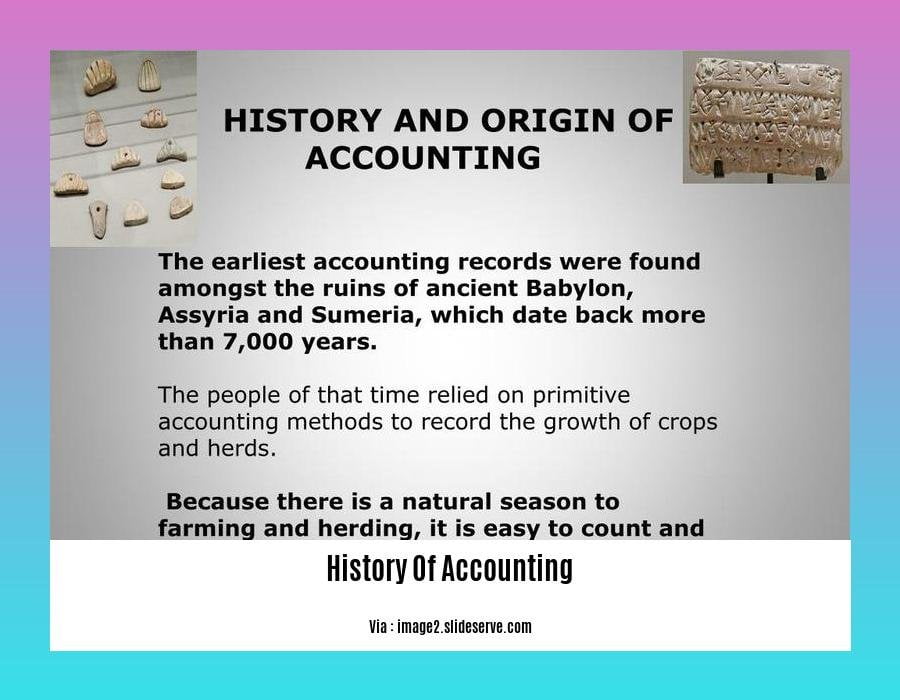

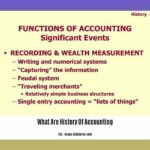
![[History of Accounting SS1]: A Journey Through the Evolution of Financial Practices history-of-accounting-ss1_2](https://www.lolaapp.com/wp-content/uploads/2023/12/history-of-accounting-ss1_2-150x150.jpg)
